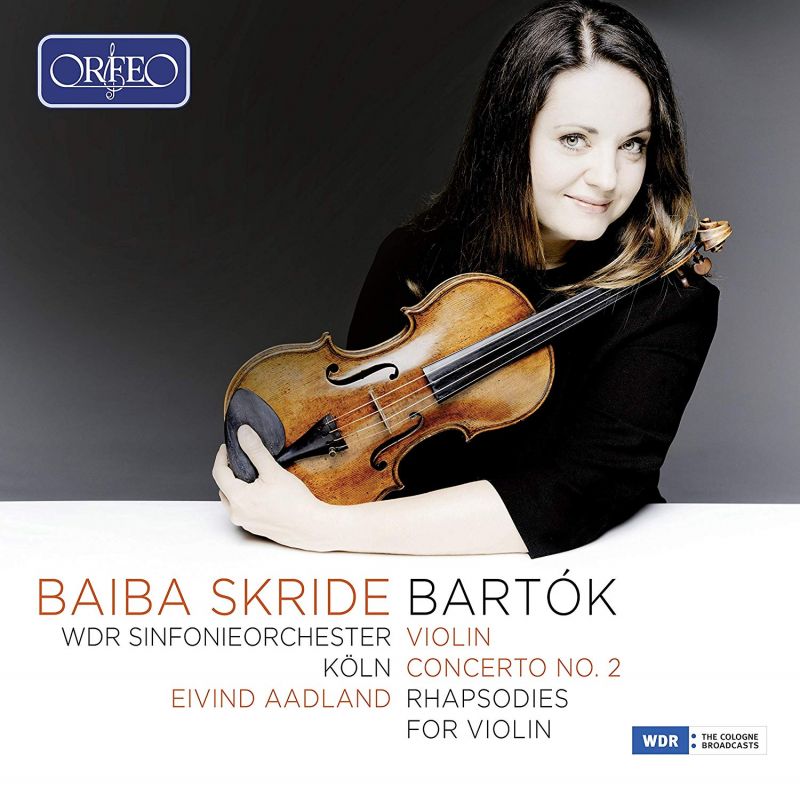BARTÓK Violin Concerto No 2 (Skride)
View record and artist detailsRecord and Artist Details
Composer or Director: Béla Bartók
Genre:
Orchestral
Label: Orfeo
Magazine Review Date: 11/2019
Media Format: CD or Download
Media Runtime: 58
Mastering:
DDD
Catalogue Number: C950191

Tracks:
| Composition | Artist Credit |
|---|---|
| Concerto for Violin and Orchestra No. 2 |
Béla Bartók, Composer
Baiba Skride, Violin Béla Bartók, Composer Eivind Aadland, Conductor WDR Symphony Orchestra |
| Rhapsody No. 1 |
Béla Bartók, Composer
Baiba Skride, Violin Béla Bartók, Composer Eivind Aadland, Conductor WDR Symphony Orchestra |
| Rhapsody No. 2 |
Béla Bartók, Composer
Baiba Skride, Violin Béla Bartók, Composer Eivind Aadland, Conductor WDR Symphony Orchestra |
Author: Rob Cowan
Baiba Skride follows Tetzlaff in toying with extreme dynamics: like him, she reduces her quiet playing to the merest whisper, a glow-worm in the undergrowth, and her sense of colour (witness how she manipulates vibrato) is extremely vivid. But she can be boldly assertive too, while Eivind Aadland’s Cologne accompaniment levels with Dorati’s (with Menuhin), Kocsis’s (Kelemen) or Fischer’s (Zehetmair) for keenness of attack. You can tell that there’s a real connection going on here, whether in the brazen tutti passages or in Skride’s handling of the first movement’s cadenza. She never baulks at the prospect of using glissando as a folksy expressive device (Bartók’s own directive) and tension is maintained throughout all three movements.
The balance between soloist and orchestra is especially well judged and Orfeo’s recording never stints on the bass line, especially the bass drum at 9'04" in the first movement, or at the start of the Second Rhapsody’s second movement. The concerto’s second movement emerges in its true colours, part slow movement, part scherzo, the apparent dichotomy making perfect musical sense. The two Rhapsodies are good too: Aadland really lunges at the opening of the First whereas the more Eastern inflections of the Second Rhapsody’s first movement are quite gently handled. Luminosity was obviously an interpretative priority.
A recommendation? Definitely. A top recommendation? A difficult call, that, especially in view of Tetzlaff’s excellence (his coupling is a benchmark account of the First Concerto), while the warmly persuasive James Ehnes (Chandos) offers a matchless deal by adding the Viola Concerto to the two violin concertos. I always feel that the ‘if-you-stumble-across-this-version-before-any-others …’ type of recommendation is a bit of a cop-out. Of course, it’s true, but if you want the best, Tetzlaff and Kelemen are somewhat ahead in the game. Skride isn’t quite on their level but her conviction wins through, her actual playing is excellent, Aadland directs a commanding account of the orchestral score and the sound is superb. So why hold back? After all, there should always be room on your shelves for another fine Bartók Second Concerto.
Discover the world's largest classical music catalogue with Presto Music.

Gramophone Digital Club
- Digital Edition
- Digital Archive
- Reviews Database
- Full website access
From £8.75 / month
Subscribe
Gramophone Full Club
- Print Edition
- Digital Edition
- Digital Archive
- Reviews Database
- Full website access
From £11.00 / month
Subscribe
If you are a library, university or other organisation that would be interested in an institutional subscription to Gramophone please click here for further information.




